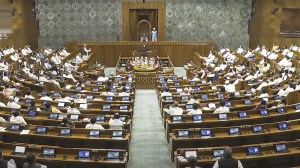Women freedom fighters missing, more male than female characters: SCERT’s audit flags lack of gender sensitivity in textbooks
Published Tuesday, the audit examined 53 textbooks and curricula of 13 subjects including Social Studies, Punjabi, Home Science, EVS, English (Bridge Course Level I to IV), and Hindi (Bridge Course Level I to IV).
 On the audit committee were gender experts from the NCERT, Delhi University, DCPCR, and other NGOs.
On the audit committee were gender experts from the NCERT, Delhi University, DCPCR, and other NGOs.
Women freedom fighters missing, usage of terms like ‘Bacha’ or ‘Balak’, more male than female characters: A lack of gender sensitivity in existing school textbooks has been flagged in in a gender audit report by the Delhi State Council of Educational Research and Training (SCERT).
Published Tuesday, the audit examined 53 textbooks and curricula of 13 subjects including Social Studies, Punjabi, Home Science, EVS, English (Bridge Course Level I to IV), and Hindi (Bridge Course Level I to IV).
The report said: “The continuation of such content in textbooks, which contain elements of patriarchal dominance and neglected participation of women and other genders, may reinforce similar lessons in the classroom environment…”
In the Deshbhakti curriculum, for instance, a key finding listed in the report says there is scope to include ‘equitable gender representation’. The observation stated, “There are opportunities to include gender-equal characters in stories in the Deshbhakti manual. Imbalance is predominantly seen in examples of patriots of both pre- and post-independence period where mostly male freedom fighters are highlighted in manuals of classes 6th to 12th…”
On the Happiness Curricu-lum, one of the observations stated, “There are opportunities to include gender-equal representation of characters in the stories in the… handbooks. Most handbooks have male characters exceeding the female ones; for example, in the handbook for class 7, there are 20 stories in which there are a total of 38 male and 4 female characters…” The report further pointed out terms in textbooks like ‘Bacha’ or ‘Balak’ which are not gender-neutral. It also said transgender and non-binary persons have not been included anywhere in the manual and textbooks.
Speaking to The Indian Express, an official at SCERT Delhi, who did not wish to be named, said, “We carried out the audit for textbooks of classes I to VIII on a request by the Delhi Commission for Protection of Child Rights (DCPCR). It is happening for the first time; soon, NCERT shall implement the recommendations of this report while revising their textbooks. The main objective was to sensitise textbook content and promote gender equality.”
On the audit committee were gender experts from the NCERT, Delhi University, DCPCR, and other NGOs.
Gauri Sharma, who was with the DCPCR and was among the experts on the committee, said: “… One of the specific recommendations was to avoid content that reinforces stereotypes and to consciously include representations of women in leadership roles. The committee emphasises the importance of gender-neutral language, inclusion of transgender individuals, and highlighting achievements of all genders in unconventional fields.”












